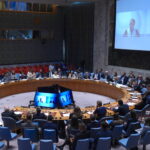The committee’s draft funding bill would ban funding for the U.N. Secretariat until the body provides the State Department with a copy of its investigations into UNRWA employees’ participation in Oct. 7

Rafah Police
Armed men sit atop a U.N. aid truck outside a U.N. logistics facility in the Gaza Strip
The House Appropriations Committee’s draft 2026 National Security, Department of State and Related Programs Appropriations bill, released on Monday, aims to leverage U.S. funding for the United Nations to secure accountability for United Nations Relief and Works Agency employees’ involvement in the Oct. 7, 2023, Hamas attacks on Israel.
It also more broadly aims to enact cuts for the U.N. system, cutting all U.S. funding for the U.N.’s regular budget and barring funding for the U.N. Human Rights Council, including its commission of inquiry investigating Israel, the International Court of Justice and the International Criminal Court.
The bill would ban any funding for the U.N. Secretariat, the arm of the U.N. led by the secretary-general responsible for daily management and operations matters, until several conditions relating to UNRWA accountability are met.
The bill would hold the funds until the U.N. provides the State Department with a full and unredacted copy of the U.N.’s internal investigation into UNRWA affiliates’ involvement in the Oct. 7 attacks and until the findings of U.S. investigations into the situation are referred to the Department of Justice for appropriate criminal or civil action.
It also mandates that the U.N. initiate and expedite proceedings to suspend and blacklist UNRWA individuals involved in the Oct. 7 attacks and that the secretary-general provide written guarantees that he will not invoke U.N. privileges and immunities to protect U.N. affiliates in cases involving gross violations of human rights, terrorism, support for terrorism or other serious crimes including corruption.
The bill maintains the ban on UNRWA funding and stringent oversight provisions for Gaza aid implemented in other recent appropriations bills.
In addition to existing restrictions relating to funding and other support for the Palestinian Authority and the Palestine Liberation Organization, the draft bill adds a new condition preventing the opening of a PLO office in the U.S. if the Palestinians “initiated any further action, whether directly or indirectly, based on an Advisory Opinion of the International Court of Justice that undermines direct negotiations to resolve the Israeli-Palestinian conflict, including matters related to final status and Israel’s longstanding security rights and responsibilities.”
It also adds a new provision barring the establishment of any diplomatic facility in Jerusalem other than the U.S. embassy, aiming to bar the reestablishment of the U.S. consulate in the city that previously worked with Palestinians.
Breaking with longstanding practice, the bill also directs the Department of State to consider the West Bank and Gaza as separate units for budgeting purposes; they have traditionally been treated collectively as one unit.
The legislation maintains the expected $3.3 billion in foreign military funding for Israel and also includes $1.42 billion in aid for Egypt, $1.3 billion of that in military aid, and $1.65 billion in aid for Jordan, $845 million in budget support and $425 million in military aid.
The legislation removes provisions included in 2024 appropriations legislation that prohibited military education and training funding for Saudi Arabia and that barred funding to support a Saudi nuclear program unless Saudi Arabia agreed to strict controls including renouncing uranium enrichment and reprocessing.
Overall, the bill cuts 22% from the current funding level, a cut that Rep. Lois Frankel (D-FL), the ranking member of the State, Foreign Operations, and Related Programs Subcommittee, said “takes us down a dangerous path of recklessness and isolation.”
Rep. Mario Diaz Balart (R-FL), the subcommittee chairman, said, “We are fulfilling our national security commitments in putting America’s interests first while protecting U.S. taxpayer dollars.”
The subcommittee will meet to discuss the bill on Tuesday.






























































